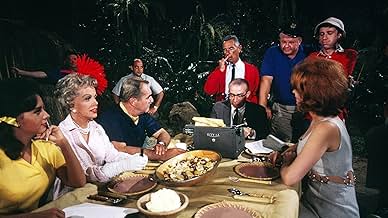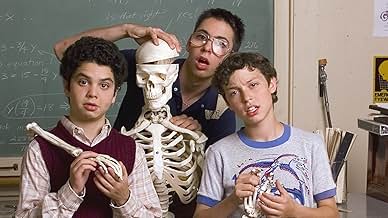Reuniendo a las audiencias con los personajes de televisión con los que crecieron mientras presentan comedias que seguramente se verán en exceso.Reuniendo a las audiencias con los personajes de televisión con los que crecieron mientras presentan comedias que seguramente se verán en exceso.Reuniendo a las audiencias con los personajes de televisión con los que crecieron mientras presentan comedias que seguramente se verán en exceso.
- Premios
- 1 nominación en total
Explorar episodios
Opiniones destacadas
A pathetic, scary footnote for 2021 - So many of these comedians, notably Jerry Seinfeld et al, refuse to perform at any of today's college campuses because the students have lost their sense of humor. With so many social agendas, there are too many people that are sitting on the edge of the seat ready to be offended and attack.
Scary.
Scary.
This is an excellent and thorough examination of many of the most popular sit-coms and how the medium - unique in its widespread influence - interacts with society. The episodes are watchable and light, due to the presentation consisting of quickly interspersed clips of the sitcoms themselves, news clips showing life outside the TV, and interviews with people who have devoted their entire lives to the industry (sometimes from childhood).
I appreciate how it looks at the whole history within each episode, focusing on a particular facet of society (family, work, sex, race, etc.). The viewer is able to join actors, writers, producers, and critics of the shows we've all grown up with and hear stories explaining how the paths of shows were forged and how current entertainment is related to the very different earliest shows of 70 years ago.
People who don't like the diversity being explored in society today - and therefore within up-to-date popular culture - might not appreciate the value of this. This documentary series is acknowledging the ways our world has changed, not politicizing (unlike many of the reviews listed here). It's a valuable contribution to the history of popular culture.
I appreciate how it looks at the whole history within each episode, focusing on a particular facet of society (family, work, sex, race, etc.). The viewer is able to join actors, writers, producers, and critics of the shows we've all grown up with and hear stories explaining how the paths of shows were forged and how current entertainment is related to the very different earliest shows of 70 years ago.
People who don't like the diversity being explored in society today - and therefore within up-to-date popular culture - might not appreciate the value of this. This documentary series is acknowledging the ways our world has changed, not politicizing (unlike many of the reviews listed here). It's a valuable contribution to the history of popular culture.
The content of this show is interesting, which is why I rated it as highly as I did. Unfortunately, from the first 5 minutes of episode 1, the series is decidedly hard left, which is so unnecessary. Who wants to hear smug talking heads pontificate on how bad sitcoms were in the 50's, 60's, and 70's, because all the shows were about White people?
The hard left focus was a bit of a surprise to me, as I had seen CNN documentary series in the past, like the ones of the decades (e.g., 60's, 70's, 80's, 90's) as well as their History of Comedy series, and they were all pretty much down-the-middle without an overt political agenda. Why they chose to have such a strong progressive point of view for this series is sad, and shows how much CNN has drank the Kool-Aid.
Episode 2, ostensibly about the evolution of showing sex on sitcoms was instead about 75% about the plight of LGBTQ. In episode 3, "Friends" co-creator Marta Kauffman had to apologize on camera for all the main characters being White.
Normally, I would wait until I had seen the entire series, but now that I've seen six of the eight episodes, my opinion is already baked in. I look forward to watching the final two episodes and learning more about how straight White men are the bane of human existence...and the TV sitcom.
The hard left focus was a bit of a surprise to me, as I had seen CNN documentary series in the past, like the ones of the decades (e.g., 60's, 70's, 80's, 90's) as well as their History of Comedy series, and they were all pretty much down-the-middle without an overt political agenda. Why they chose to have such a strong progressive point of view for this series is sad, and shows how much CNN has drank the Kool-Aid.
Episode 2, ostensibly about the evolution of showing sex on sitcoms was instead about 75% about the plight of LGBTQ. In episode 3, "Friends" co-creator Marta Kauffman had to apologize on camera for all the main characters being White.
Normally, I would wait until I had seen the entire series, but now that I've seen six of the eight episodes, my opinion is already baked in. I look forward to watching the final two episodes and learning more about how straight White men are the bane of human existence...and the TV sitcom.
I thought this was supposed to be the history of sitcom. Instead it is a sloppy, quick run through some popular and lesser known sitcoms. It's basically a short interview, less than a minute, then footage from the show. The retrospective on the show are brief and poorly explained.
Each episode starts in the 50s and ends in present day. Each episode also complains about minorities, women, and homosexuals not being on TV or if they were it was shown in a very stereotypical form. I do agree with this idea, literally every episode devolves into this. They should have make one episode in the shunning of aforementioned groups. I would guess 60-70% of this series is complaints about how minorities were treated.
It's amazing that they had such an enormous body of work to comment on and they come up with this. Its not the worst documentary I have seen but given the production value and money behind the documentary It's amazing they go for such boring low hanging fruit.
If you are looking for any kind.
Each episode starts in the 50s and ends in present day. Each episode also complains about minorities, women, and homosexuals not being on TV or if they were it was shown in a very stereotypical form. I do agree with this idea, literally every episode devolves into this. They should have make one episode in the shunning of aforementioned groups. I would guess 60-70% of this series is complaints about how minorities were treated.
It's amazing that they had such an enormous body of work to comment on and they come up with this. Its not the worst documentary I have seen but given the production value and money behind the documentary It's amazing they go for such boring low hanging fruit.
If you are looking for any kind.
I would love to see a really good history of the sitcom without all the same players. Of course they were vital , but this series brushes over the 50's and naturally spends most of its time on I Love Lucy. So many other shows that could be explored. They drag Norman Lear, Suzanne Somers, Eric McCormick out to expound and naturally we once again visit, Maude, Good Times, Modern Family ad nauseam.
The sitcom is a special art, a half hour format whose style comes from that 2/ minutes of entertainment.
Sex and the City, Fleabag, and others mentioned are not sitcoms. This ruined the whole premise of the show. So far, very bored.
The sitcom is a special art, a half hour format whose style comes from that 2/ minutes of entertainment.
Sex and the City, Fleabag, and others mentioned are not sitcoms. This ruined the whole premise of the show. So far, very bored.
¿Sabías que…?
- ConexionesReferenced in Late Night with Seth Meyers: Amy Poehler/Joseph Gordon-Levitt/Kevin Smith (2021)
Selecciones populares
Inicia sesión para calificar y agrega a la lista de videos para obtener recomendaciones personalizadas
- How many seasons does History of the Sitcom have?Con tecnología de Alexa
Detalles
- Fecha de lanzamiento
- País de origen
- Sitio oficial
- Idioma
- También se conoce como
- L'histoire des sitcoms
- Productora
- Ver más créditos de la compañía en IMDbPro
Contribuir a esta página
Sugiere una edición o agrega el contenido que falta
































